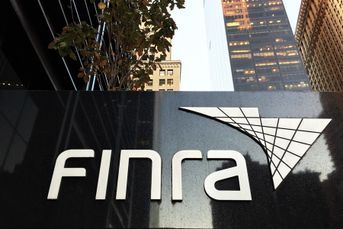Indie B-D recruitment slowing after torrid ’09
Leading independent broker-dealers are experiencing a sharp slowdown in efforts to sign up new representatives and advisers after…
Leading independent broker-dealers are experiencing a sharp slowdown in efforts to sign up new representatives and advisers after the torrid pace of recruiting in 2009.
While their reporting periods differ, LPL Investment Holdings Inc. last week said that its 2010 recruiting declined by 40% through March; executives at Raymond James Financial Services Inc. said last month that recruitment has declined by almost 50% in its current October-to-September fiscal year, and Commonwealth Financial Network has seen a drop of 30% this year.
The decrease in recruiting follows the calamitous events of 2008 and early 2009, which unleashed a torrent of movement among brokers and advisers. As a result, last year was a banner year for recruiting in the independent-broker-dealer industry.
The first six months of last year were particularly strong, as stock market turmoil caused many in-vestors — and their brokers — to leave traditional firms.
Other factors that led to a spike in broker movement at the time included the upheaval at three broker-dealers under the AIG Advisor Group, now simply Advisor Group, which sparked an exodus of brokers, and the merger of Morgan Stanley and Smith Barney. That consolidation — and crucially, management’s subsequent decision to cut the lowest-producing advisers — put many brokers in play.
But since last summer, several factors have conspired to slow broker movement.
To stem the tide of defections, wirehouses began offering brokers attractive retention bonuses that will keep many reps and advisers tied to their firms for as long as nine years, industry observers said.
Ronald Kruszewski, chief executive of Stifel Financial Corp., which has both employee and independent-contractor reps, said recruiting has slowed down because “the big firms trying to stem their losses … have really kicked up their recruiting packages to levels where we don’t want to play.”
Since marketplace havoc was instrumental in the success of independent broker-dealers’ recruiting efforts in the first part of last year, it’s logical that recruitment has now slowed, said Darin Manis, chief executive of RJ & Makay, a recruiting firm that focuses on wirehouse reps.
“Take all that off the table, and you don’t have a spike in broker movement,” he said. Independent broker-dealers and advisers were the “biggest beneficiaries” of the chaos on Wall Street, he said.
This year has yet to see the kind of event that would push brokers to move in droves, noted Larry Papike, president of Cross-Search, a recruiting and executive search firm for independent broker-dealers.
But while 2010 has started out slowly for broker recruiting, the year could still shape up nicely, said Bill McGovern, president of BD Search, an industry recruiter.
“I think this year could be a good year, but not nearly as good as 2009,” he said. “We may never see that kind of recruiting year again in our lifetime.”
Some smaller independent -broker-dealers, however, continued to increase recruiting in the first quarter. Referrals from its own reps helped Cambridge Investment Research Inc. recruit brokers and advisers with $17.5 million in fees and commissions, an increase of 47% when compared with a year earlier, said Kyle Selburg, vice president in charge of recruiting.
Likewise, First Allied Securities Inc. was “playing catch-up” during the first quarter, bringing on reps and advisers with $15 million in fees and commissions, said chief executive Adam Antoniades. That was close to double its recruiting activity for the same period last year, he said.
For the 12-month period ended March 31, LPL added a net of 450 new reps and advisers, the company said in its quarterly earnings report. Last year, LPL added 750 net new reps and advisers, revealing a slowdown in new additions as the year progressed.
LPL’s results didn’t take into account brokers who left the firm when it integrated three separate broker-dealers — Associated Securities Corp., Mutual Service Corp. and Waterstone Financial Group — onto its platform in September.
Robert Moore, LPL’s chief financial officer, declined to comment specifically about the firm’s recent recruiting results, saying that it is “premature” to announce any trend and that LPL doesn’t look at these results on a quarterly basis.
“The trend of movement into independent advice is a longer-term trend. We are well-positioned to benefit from that and still feel good about the fundamentals of the marketplace,” Mr. Moore said.
“Although recruiting has slowed from the record levels of the last two years, activity has recently in-creased,” said Thomas James, chairman of Raymond James Financial Inc., the parent company of independent- broker-dealer subsidiary Raymond James Financial Services Inc.
Richard G. Averitt III, chief executive of the independent broker-dealer, said that recruiting during this fiscal year is half of what it was in fiscal 2009, which ended in September. During that period, the firm recruited about 550 reps and advisers.
Andrew Daniels, managing principal of field development with Commonwealth Financial Network, said that the firm’s recruiting results this year have been more in line with the years before the financial crisis.
“It’s tough to say you’re happy after last year, but we’re actually up when compared to 2008,” he said.
Mr. Daniels said he is confident that the firm will get “our 100 quality players” — Commonwealth’s annual goal — which it exceeded last year.
Commonwealth has 1,314 reps and advisers.
The falloff in recruiting comes at the same time that firms are posting strong profits.
Although recruiting slowed last quarter at LPL, its net income for the first three months of the year increased 72.7% when compared with a year earlier, reaching $25.6 million. LPL’s net revenue increased 15.6%, reaching $743.4 million.
LPL is the largest independent broker-dealer in the U.S., with about 12,000 brokers and advisers.
Raymond James Financial last month said that its net income in the first three months of the year rose to $56 million, or 45 cents a share, from $6 million, or 5 cents a share, a year earlier.
The company has more than 5,300 reps and advisers in the United States, Canada and the United Kingdom. Raymond James Financial Services accounts for about two-thirds of that total.
E-mail Bruce Kelly at [email protected].
Learn more about reprints and licensing for this article.








